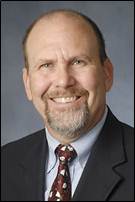Podcast: Play in new window | Download
Subscribe: Apple Podcasts | RSS
Dr. Andrew Fry is a Professor in the Department of Health, Sport, and Exercise Sciences at the University of Kansas. He received his Masters in Exercise Science from the University of Nebraska – Lincoln and his PhD in Exercise Physiology from Pennsylvania State University. He then went on to do a postdoctoral fellowship in the College of Osteopathic Medicine and Department of Biological Sciences at Ohio University. Andy is with us today to tell us about his journey through life and science.
Dr. Fry served on the faculty at the University of Memphis for 13 years, during which he was the Director of the Exercise Biochemistry Laboratory, and served as the Graduate Coordinator in the Department of Health and Sport Sciences. In 2007, he relocated to the University of Kansas as Department Chair. In 2008, in collaboration with KU Athletics, Inc., he co-found the Research and Coaching Performance Team to address sport performance research needs for KU student-athletes. In addition to his numerous research publications and presentations, as well as the many invited lectures, Dr. Fry has served as a board member and vice-president of the 40,000 member National Strength and Conditioning Association. He is currently the Past-President of the Central States Chapter of the American College of Sports Medicine. Besides serving as a reviewer for numerous scientific journals, he has also worked as a consultant for organizations such as the U.S. Army, the U.S. Space Biomedical Research Institute, and the Nebraska Athlete Performance Laboratory. He is married to Dr. Mary Fry, a sport and exercise psychologist, and has two children, Jared and Lindsey.
Dr. Fry’s research has focused on several main areas, skeletal muscle physiology concerning responses and adaptations to exercise, primarily resistance exercise. In addition, he examines the interface between the muscle and endocrine systems in exercise settings. In each setting, the relationships between physiology and performance are examined. Finally, the topic of overtraining and diminished performance is also studied within the context of the above listed systems.
